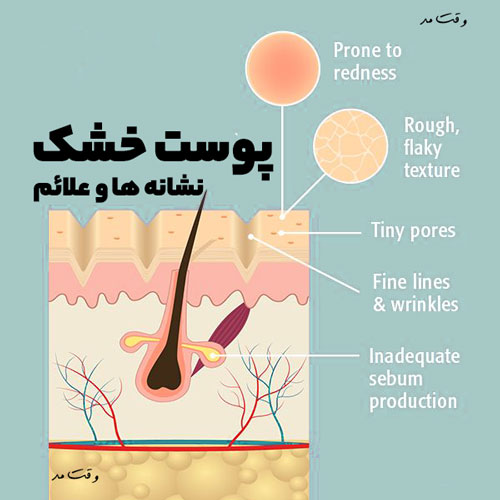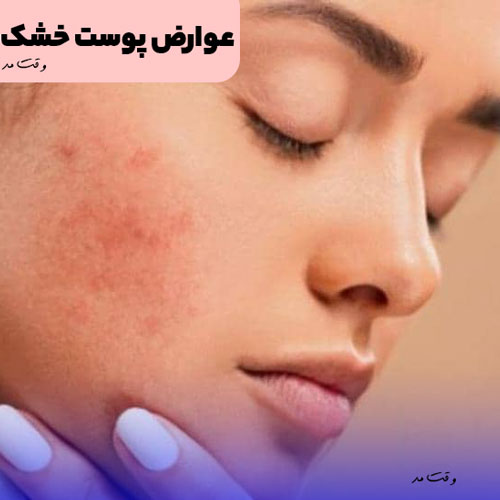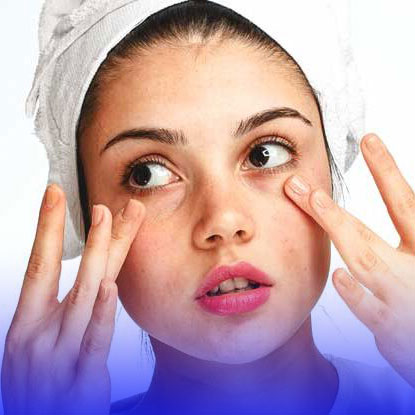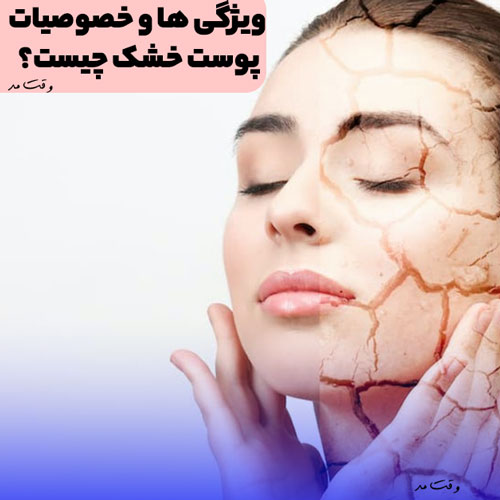As you know, hand and face skin can be dry, oily, mixed or normal. Men and women have different skin types due to environmental conditions, genetics, hot and cold weather, or other factors. But do you know your skin type!? Do you have dry skin and do not know the causes? with dry skin characteristics (Dry skin) and are you familiar with its cause and treatment?!
If you have dry skin and know the factors that cause it, you can easily prevent this type of skin. You can even treat, maintain and care for dry skin.
In this part of the fashion beauty and makeup magazine (Vaghtemod.ir), we describe all the signs and symptoms of dry skin and its causes, methods of prevention and even when to see a specialist doctor in severe conditions.
Follow the latest and most important scientific content related to beauty, maintenance and skin health in the fashion magazine.
What are the features and characteristics of dry skin?
In previous articles, we explained about the characteristics of skin types. dry skin (Dry skin); It occurs due to low activity of parotid glands and lack of water supply. Eventually, you will see premature lines and wrinkles. This sensitive skin with closed pores usually has a rough, scaly and red appearance.
skinSkin), is usually the largest organ of the human body, because its approximate area is two square meters. For this reason, facial skin, as a large part of the face, plays a very important role in our beauty and face. In addition, facial skin as a living organ has a great impact on people’s health.
Dry skin has little elasticity and is rough to the touch and lacks softness and smoothness. When you have dry skin, your hands and face are rough, hard, scaly, cracked and even with wrinkles. In fact, dry skin produces fewer oil glands than normal skin.
dry and rough skin; Because it is thin and fragile, it will need more care and maintenance than other types of skin.

Read more: What is Sebum? Treatment, control and protection of the natural fat of the skin and hair.
Why is the skin dry?
The skin consists of several layers. The outermost layer of the skin, called the epidermis.Epidermis) protects it. Thanks to the epidermis, water and other pollutants cannot enter our body and thus maintain the balance. Think of the epidermis as a brick wall. The bricks of this wall are keratinocyte cells (Keratinocyte cells) are called that destroy dead cells and create space for fresh and new cells.

The cement that holds these bricks together is lipids. Lipids include different types such as cholesterol, fatty acids, water-soluble components and natural hydration. function of lipids; It is keeping the bricks next to each other and sealing the wall so that water does not escape.
Further reading: Everything you need to know about skin.
Scientifically, why does dry skin occur?
Reasons that cause dry skinDry skin) include these items:
- The maturation process of keratinocyte cells is not done properly, and in fact, the “bricks” or skin cells are of low quality, so the skin becomes dry.
- The change in lipids (the cement that holds the bricks) is such that the structure and resistance of the skin is affected and allows more water to be lost, resulting in dryness of the skin.
- Less secretion of the sebaceous gland, which changes the hydrolipidic layer.
- Deficiency in the function of filaggrin protein, which is part of the natural hydration factor, is also one of the reasons for dry skin.
Read more: The best homemade mask for skin lightness and whiteness! Get to know the best skin lightening mask.
What are the signs and symptoms of dry skin?
Severe dryness of the skin is often temporary and, for example, becomes severe in autumn and winter due to weather changes. The signs and symptoms of dry skin depend on factors such as age, health status, place of residence, genetics, and time spent outside.
What are the side effects of dry skin?
In general, drying of the skin can be one of the reasons for the complications mentioned below. Dry skin results in the following complications:

- The feeling of skin tightening, especially after showering, bathing, or swimming, is one of the side effects of dry skin.
- Rough, rough and wrinkled skin
- Itchy skin
- Mild to severe peeling or scaling
- Fine lines or cracks on the hands and face
- Redness in the skin
- Deep cracks in the hands, face, and soles of the feet that can bleed.
Learn about skin: types of skin spots, get to know the characteristics and causes of skin spots.

The most important factors of dry skin
Various reasons such as aging (as the age increases, the secretion of sebaceous glands decreases), Hormonal changes, environmental and external factors can cause dry skin. Also, Excessive heat and cold With the reduction of natural hydration, they are the causes of dry and rough skin.
In addition, Prolonged exposure to sunlight Also, it increases the dryness of the skin. Continuous use of soaps and detergents; They also cause the loss of natural skin oils and as a result dry hands and face. Some diseases can significantly affect the skin.
More training: 5 important techniques in teaching maintenance and care of oily skin.
The most important factors and causes of dry skin
- In winter, when Temperature and humidity decreaseThe skin becomes drier.
- Central heating, wood stoves, heaters and fireplaces They reduce body moisture and lead to dry skin.
- Taking a shower or taking a long hot showercan dry your skin. Frequent swimming, especially in highly chlorinated pools; It is also the cause of dry skin.
- many of Soaps, detergents and shampoos They absorb moisture from the body because they are formulated to eliminate fat.
- People with Skin diseases, such as atopic dermatitis (eczema) or psoriasisare prone to dry skin.
- If you are 40 years old or older, you probably have dry skin. More than 50% of elderly people have dry skin.

Know about the skin: Know the types of facial and body acne, its cause, diagnosis and treatment!
What happens if there are changes in the pH of the skin?
If the pH of the body increases and becomes more alkaline, the enzymes of the skin will lose their activity and eventually your skin will dry out. As the PH of the body increases; The important lipids of the skin lose their function, and because of this, the body cannot resist infection and itching of the skin.

If, on the contrary, the pH of the body decreases and becomes too acidic, inflammation and redness of the skin will occur. Everything that comes into contact with your skin, including cleaning and care products, pollution, polluted water, direct sunlight, cigarette smoke and tobacco can affect the body’s PH balance. Learn more about this: How to choose the best sunscreen for your skin! Guide to choosing the best sunscreen.
Therefore, our skin needs mild detergent and care products with an acidic PH to maintain the balance of the acidity of the skin of the hands and face. One of the important things in the treatment of dry skin; It is your skin color that you should know and act accordingly.
Read more: What are the types of skin color? What determines our skin color!?.
What are the problems and complications caused by dry skin?
Having dry skin is usually not harmful, but in the absence of necessary care and treatment, it can lead to problems such as the following:
- atopic dermatitis (eczema) One of the side effects is dry skin.
If you are prone to eczemaEczema), too much dryness can cause this problem that causes redness, cracking of the skin, swelling and itching of the skin. - Skin infections : Dry skin allows bacteria and pollution to enter the body and as a result cause skin infection.
- When the skin’s natural protective mechanisms are severely damaged, these complications are more likely to occur. For example, very dry skin can cause deep cracks or fissures, which open and bleed, allowing invading bacteria to enter.

Read more about Skin Health: Daily Skin Care Routine! Get to know the most important things in your skin care routine during the day.
Methods to prevent dry skin
In general, to prevent excessive drying of hands and face, observe the following points:
- Good moisturizer In addition to hydrating and softening the skin, it prevents water from leaving the body and is very useful for treating dry skin.
- to prevent skin dryness; Limit exposure to water. Limit the time you spend in the bathtub or shower to 10 minutes or less. Try to wash your skin with lukewarm water, not too hot.
- Reduce the use of soap for washing hands and face. Instead, use gentle skin cleansing creams, facial wash gels and moisturizers to prevent skin dryness.

- In cold weather, cover your hands and face as much as possible. Winter can dry out your skin. Therefore, in this season, use a scarf, hat and gloves when going out.
- Use rubber gloves. If your hands are constantly in water or you use strong cleansers, wearing gloves can help protect your skin from dryness.
Read more about facial skin: What is hypotherapy? (HIFU) Know all the benefits and side effects of facial hypotherapy!
When do you need to see a doctor for dry skin?
In most cases, dry skin can be cured with home remedies and a healthy lifestyle. In severe cases without treatment, you should see a dermatologist:
- If the skin does not improve despite the home remedies you do.
- If dry skin is accompanied by redness and itching; It’s time to see a doctor.
- If dryness and itching of hands and face prevent you from sleeping well.
- If you have an open wound or an infection caused by scratching the skin, you should see a specialist doctor.
- If you have large areas of exfoliation or scaling on your body that does not respond to home remedies.
RCO NEWS
RCO

















